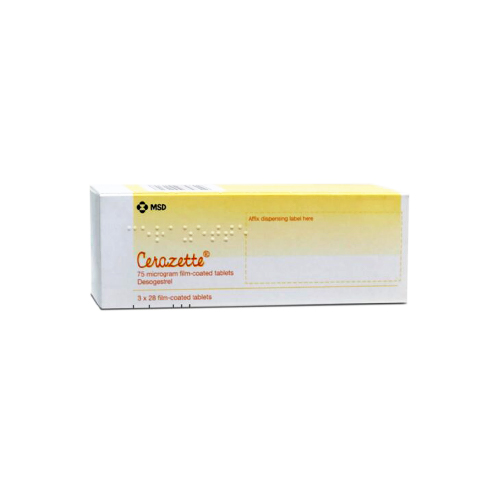- Effective contraception
- Alternative to Oestrogen
- Mini-pill
Cerazette
Cerazette tablets contain a small amount of one type of female sex hormone called desogestrel. In contrast to the combined pill, Cerazette can be used by women who do not tolerate oestrogen and by women who are breastfeeding.
What is Cerazette?
Cerazette is used to prevent pregnancy.
Cerazette is a progestogen-only pill (POP).
Cerazette contains a small amount of one type of female sex hormone, the progestogen desogestrel.
In contrast to the combined pill, Cerazette can be used by women who do not tolerate oestrogens and by women who are breastfeeding.
A disadvantage is that vaginal bleeding may occur at irregular intervals during the use of Cerazette.
How does Cerazette work?
Most POPs work primarily by preventing the sperm cells from entering the womb but they do not always prevent the egg cell from ripening, which is the main way that combined pills work.
Cerazette is different from most POPs in having a dose that in most cases prevents the egg cell from ripening. As a result, Cerazette is a highly effective contraceptive.
How to take Cerazette
When and how to take the tablets?
Each strip of Cerazette contains 28 tablets – 4 weeks supply.
- Take your tablet each day at about the same time. Swallow the tablet whole, with water.
- Arrows are printed on the front of the strip, between the tablets. The days of the week are printed on the back of the strip. Each day corresponds with one tablet.
- Every time you start a new strip of Cerazette, take a tablet from the top row. Don’t start with just any tablet. For example if you start on a Wednesday, you must take the tablet from the top row marked (on the back) with WED.
- Continue to take one tablet every day until the pack is empty, always following the direction indicated by the arrows.
- You may have some vaginal bleeding during the use of Cerazette, but you must continue to take your tablets as normal.
- When a strip is empty, you must start with a new strip of Cerazette on the next day – without interruption and without waiting for a bleed.
Starting your first pack of Cerazette
If you are not using hormonal contraception at present (or in the past month)
Wait for your period to begin. On the first day of your period take the first Cerazette tablet. Additional contraceptive precautions are not necessary. If you take your first tablet on days 2-5 of your period use an additional barrier method of contraception for the first 7 days of tablet-taking.
If you forget to take Cerazette
- If you are less than 12 hours late:
- Take the missed tablet as soon as you remember and take the next one at the usual time. Cerazette will still protect you from pregnancy.
- If you are more than 12 hours late:
- If you are more than 12 hours late in taking any tablet, you may not be completely protected against pregnancy. The more consecutive tablets you have missed, the higher the risk that you might fall pregnant.
- Take a tablet as soon as you remember and take the next one at the usual time. This may mean taking two in one day. This is not harmful. (If you have forgotten more than one tablet you don’t need to take the earlier missed ones). Continue to take your tablets as usual but you must also use an extra method, such as a condom, for the next 7 days.
- If you are more than 12 hours late taking your tablet and have had sex it is safe to use emergency contraception; please consult your pharmacist or doctor.
- If you missed one or more tablets in the very first week of starting the tablet and had intercourse in the week before missing the tablets, you may fall pregnant. Ask your doctor for advice.
If you vomit
If you vomit within 3 – 4 hours after taking your Cerazette tablet or have severe diarrhoea, the active ingredient may not have been completely absorbed.
Side effects & precautions
What you need to know before taking Cerazzette
Cerazette, like other hormonal contraceptives, does not protect against HIV infection (AIDS) or any other sexually transmitted disease.
Do not take Cerazette
- if you are allergic to desogestrel, or any of the other ingredients of Cerazette (listed in section 6).
- if you have thrombosis. Thrombosis is the formation of a blood clot in a blood vessel [e.g. of the legs (deep venous thrombosis) or the lungs (pulmonary embolism)].
- if you have or have had jaundice (yellowing of the skin) or severe liver disease and your liver is still not working normally.
- if you have or if you are suspected of having cancer that grows under the influence of sex steroids, such as certain types of breast cancer.
- if you have any unexplained vaginal bleeding.
If any of these conditions apply to you, tell your doctor before you start to use Cerazette. Your doctor may advise you to use a non-hormonal method of birth control.
If any of these conditions appear for the first time while using Cerazette, consult your doctor immediately.
Psychiatric disorders
Some women using hormonal contraceptives including Cerazette have reported depression or depressed mood. Depression can be serious and may sometimes lead to suicidal thoughts. If you experience mood changes and depressive symptoms contact your doctor for further medical advice as soon as possible.
Possible interactions with other medicines and Cerazette
Some medicines:
- Can have an influence on the blood levels of Cerazette.
- Can make it less effective in preventing pregnancy.
- Can cause unexpected bleeding.
These include medicines used for the treatment of:
- epilepsy (e.g. primidone, phenytoin, carbamazepine, oxcarbazepine, felbamate, topiramate and phenobarbital)
- tuberculosis (e.g. rifampicin, rifabutin)
- HIV infections (e.g. ritonavir, nelfinavir, nevirapine, efavirenz)
- Hepatitis C virus infection (e.g. boceprevir, telaprevir)
- or other infectious diseases (e.g. griseofulvin)
- high blood pressure in the blood vessels of the lungs (bosentan)
- depressive moods (the herbal remedy St. John’s Wort)
- certain bacterial infections (e.g. clarithromycin, erythromycin)
- fungal infections (e.g. ketoconazole, itraconazole, fluconazole)
- high blood pressure (hypertension), angina or certain heart rhythm disorders (e.g. diltiazem)
If you are taking medicines or herbal products that might make Cerazette less effective, a barrier contraceptive method should also be used. Since the effect of another medicine on Cerazette may last up to 28 days after stopping the medicine, it is necessary to use the additional barrier contraceptive method for that long.
Cerazette may also interfere with how other medicines work, causing either an increase in effect (e.g. medicines containing ciclosporine) or a decrease in effect (e.g. lamotrigine).
Ask your doctor or pharmacist for advice before taking any medicine.
Pregnancy and breast-feeding
Pregnancy
Do not use Cerazette if you are pregnant, or think you may be pregnant.
Breast-feeding
Cerazette may be used while you are breastfeeding. Cerazette does not influence the production or the quality of breast milk. However, a small amount of the active substance of Cerazette passes over into the milk.
The health of children who were breast-fed for 7 months while their mothers were using Cerazette has been studied up until they were 2½ years of age. No effects on the growth and development of the children were observed.
Side-effects
Like all medicines, Cerazette can cause side effects, although not everybody gets them.
You should see your doctor immediately if you experience allergic reactions (hypersensitivity), including swelling of the face, lips, tongue, and/or throat causing difficulty in breathing or swallowing (angioedema and/or anaphylaxis).
Common
- mood altered, depressed mood, decreased sexual drive (libido)
- headache
- nausea
- acne
- breast pain; irregular or no menstruation
- increased body weight
Uncommon
- infection of the vagina
- difficulties in wearing contact lenses
- vomiting
- hair loss
- painful menstruation, ovarian cyst
- tiredness
Reporting of side effects
If you get any side effects talk to your doctor, pharmacist or Family Planning Nurse. This includes any possible side effects not listed in this leaflet. You can also report side effects via the Yellow Card Scheme at: www.mhra.gov.uk/yellowcard
Documentation
Cerazette Patient Information Leaflet (PIL)



We’re here to help.
Our friendly team is available to help Monday to Friday 9:00am - 5:00pm.
If you need urgent assistance, do not use this service. Call 111, or in an emergency call 999.

